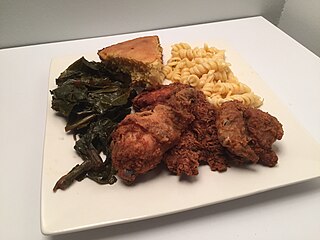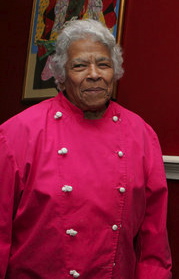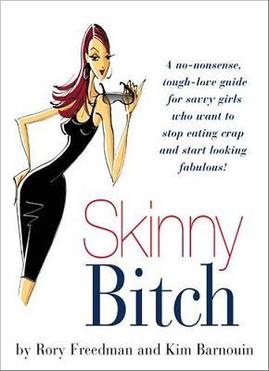
Soul food is the ethnic cuisine of African Americans. Originating in the American South from the cuisines of African slaves transported to the Thirteen Colonies during the colonial history of the United States, soul food is closely associated with the cuisine of the Southern United States. The expression "soul food" originated in the mid-1960s when "soul" was a common word used to describe African-American culture. Soul food uses cooking techniques and ingredients from West African, Central African, Western European, and Indigenous cuisine of the Americas.

The cuisine of the Southern United States encompasses diverse food traditions of several subregions, including cuisine of Southeastern Native American tribes, Tidewater, Appalachian, Ozarks, Lowcountry, Cajun, Creole, African American cuisine and Floribbean, Spanish, French, British, and German cuisine. In recent history, elements of Southern cuisine have spread to other parts of the United States, influencing other types of American cuisine.

Leyah (Leah) Chase was an American chef based in New Orleans, Louisiana. An author and television personality, she was known as the Queen of Creole Cuisine, advocating both African-American art and Creole cooking. Her restaurant, Dooky Chase, was known as a gathering place during the 1960s among many who participated in the Civil Rights Movement, and was known as a gallery due to its extensive African-American art collection. In 2018 it was named one of the 40 most important restaurants of the past 40 years by Food & Wine.

Edna Regina Lewis was a renowned American chef, teacher, and author who helped refine the American view of Southern cooking. She championed the use of fresh, in season ingredients and characterized Southern food as fried chicken, pork, and fresh vegetables – most especially greens. She wrote and co-wrote four books which covered Southern cooking and life in a small community of freed slaves and their descendants.
John T. Edge is a writer, commentator, and from 1999 to 2020 was director of the Southern Foodways Alliance, an institute of the Center for the Study of Southern Culture at the University of Mississippi. He has written several books on Southern food. For 21 years (1999-2020) he contributed to the Oxford American and for three years he contributed to the New York Times. He writes a column for Garden & Gun and has written for, among others, Afar. In 2017, he published The Potlikker Papers, a food history of the modern South.

Kimberlé Williams Crenshaw is an American civil rights advocate and a scholar of critical race theory. She is a professor at the UCLA School of Law and Columbia Law School, where she specializes in race and gender issues.

Skinny Bitch is a diet book written by former modelling agent Rory Freedman and former model Kim Barnouin.
James E. McWilliams is professor of history at Texas State University. He specializes in American history, of the colonial and early national period, and in the environmental history of the United States. He also writes for The Texas Observer and the History News Service, and has published a number of op-eds on food in The New York Times, The Christian Science Monitor, and USA Today. Some of his most popular articles advocate veganism.
Ronni Lundy, is an American author and editor, whose work focuses on traditional Southern American foods, Appalachian foods, and music.
Sheena C. Howard is an African-American academic, author and producer. She is a professor of communication at Rider University. She is also the past chair of the Black Caucus and the founder of Power Your Research, and academic branding company. Howard is the recipient of the 2014 Eisner Award for her first book Black Comics: Politics of Race and Representation (2013).

Darra Goldstein is an American author and food scholar who is the Willcox B. and Harriet M. Adsit Professor of Russian, emerita at Williams College.

Jessica B. Harris is an American culinary historian, college professor, cookbook author and journalist. She is professor emerita at Queens College, City University of New York, where she taught for 50 years, and is also the author of 15 books, including cookbooks, non-fiction food writing and memoir. She has twice won James Beard Foundation Awards, including for Lifetime Achievement in 2020, and her book High on the Hog was adapted in 2021 as a four-part Netflix series by the same name.

Amie "Breeze" Harper is an American critical race feminist, diversity strategist, and author of books and studies on veganism and racism. Her Sistah Vegan anthology features a collection of writings by black female vegans.
Founded in 1975, the Association of Black Anthropologists (ABA) is an American organization that brings together Black anthropologists in an effort to better highlight the history of African Americans, especially in regard to exploitation, oppression, and discrimination. It encourages, in particular, the involvement of Black students, including the recruitment of graduates, and establishes exchanges with African anthropologists. It publishes the journal Transforming Anthropology. The ABA seeks to address theories across academic disciplines that do not accurately represent the experience and oppression of communities of color and to aid and strengthen these theories with the inclusion of an African American historical perspective. It is one of the sections of the American Anthropological Association.
Ashley Christensen is an American chef, restaurateur, author, and culinary celebrity. She is based in Raleigh, North Carolina, and the chef + proprietor of AC Restaurants, a hospitality group that operates Poole's Diner, Fox Liquor Bar, Beasley's Chicken + Honey, Death & Taxes, Poole'side Pies, and AC Events. A two-time James Beard Award winner, she is widely credited for helping to put Raleigh's food scene on the map.

The Cooking Gene: A Journey Through African American Culinary History in the Old South is an American non-fiction book written by Michael W. Twitty. It was published in 2017 and is a food memoir. The author combines intensive genealogical and historical research as well as personal accounts to support the argument that the origin of southern cuisine is heavily based in the continent of Africa. The book was the recipient of the 2018 James Beard Foundation Book Award for Writing and Book of the Year.
Vegan studies or vegan theory is the study of veganism, within the humanities and social sciences, as an identity and ideology, and the exploration of its depiction in literature, the arts, popular culture, and the media. In a narrower use of the term, vegan studies seek to establish veganism as a "mode of thinking and writing" and a "means of critique".

Marcia Chatelain is an American academic who serves as the Penn Presidential Compact Professor of Africana Studies at the University of Pennsylvania. In 2021, she was awarded the Pulitzer Prize for History for her book Franchise: The Golden Arches in Black America (2020), for which she also won the James Beard Award for Writing in 2022. Chatelain was the first black woman to win the latter award.

The Virginia House-Wife is an 1824 housekeeping manual and cookbook by Mary Randolph. In addition to recipes it gave instructions for making soap, starch, blacking and cologne.











